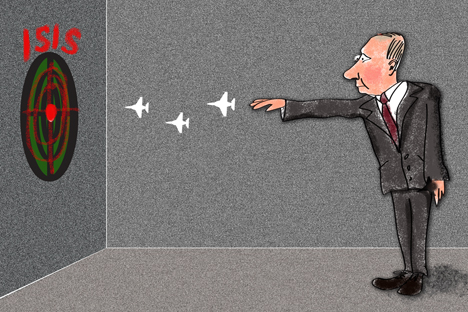
Drawing by Niyaz Karim
ISIS has established a bridgehead in Syria and other countries of the Middle East. The terrorists do not conceal their far-reaching plans for further expansion, the destabilization of more countries in the region and beyond and recruiting more people from all over the world, including Russia and our neighbors, to fight for their cause.
To pre-empt this threat to national security, as a measure of self-defense, Russia launched its military operation in Syria. It was carried out in response to a request from the Syrian government and therefore is fully in line with international law.
There is a way for everybody to carry out air strikes against ISIS and other terrorists in Syria legitimately. It means a UN Security Council mandate. Besides establishing clear-cut objectives and the terms of such collective intervention, we could agree, in this resolution, the realistic and flexible modalities of a political settlement in Syria.
Political settlement was a key topic at recent talks between President Vladimir Putin and President Bashar al-Assad in Moscow. Russian Foreign Minister Sergey Lavrov met U.S. Secretary of State John Kerry and their Saudi and Turkish counterparts in Vienna for the same reason. I am sure that all the conditions will be in place for us to have a common view of the situation and make joint efforts on that basis. It would drastically change the terrorists’ calculus while doing the same to our bilateral relationship with Britain.
We have asked our western partners to give us their intelligence on terrorist infrastructure in Syria, if they really think we are hitting the wrong targets. We have also requested contact numbers for the Free Syrian Army. The negative response shows the lack of clarity as to who’s who on the ground and who is sponsoring various groups opposing Damascus.
The preservation of secular statehood in Syria and Egypt is absolutely key, because of their centrality to regional stability. Partitioning Syria would be the worst development. Regional crises require regional solutions with all the players participating. It is true for Syria, as it is true for Afghanistan.
It means that regional security is indivisible. Various regional players’ attempts to play games of their own will bring about an implosion of the entire Middle East, very much to the satisfaction of terrorists, who recognise no borders. Hopefully, now that many things in the situation are clear enough, we’ll see the last of the tactics of ensuring one’s own security at somebody else’s expense. Chickens do come home to roost.
Our partners didn’t want to relieve the Syrian army by degrading the terrorists’ capability. But now we know the outcome of this, to put it mildly, ambivalence. Politics and statecraft are always about making hard choices. Trying to avoid it equals abdication of responsibility. Initial results of our strikes prove that the terrorists took their impunity for granted. Things are changing now. The healthy competition between two coalitions is doing its bit.
Nobody wants to deploy ground forces in Syria. Then why not let the Syrian army play this role. If not them, then who? It is no time to engage in fantasies of regime change in Syria.
And, finally, Russia stepped into the line of fire. Those on the sidelines engage in ill-wishing, foretelling casualties and quagmire. It was not an easy decision for us to make but inaction was not an option. The broad public opinion seems to share this view.
Still, we are ready to discuss anything honestly and on the basis of facts with the capitals concerned. Neither “Great Games” nor Cold War geopolitics will help us deal with this threat to international security. It is a common threat and it must be addressed collectively. As President Putin emphasised, speaking at the recent Valdai meeting, we want to work together with everybody on Syria.
Alexander Yakovenko is Russian Ambassador to the United Kingdom. He was previously Deputy Minister of Foreign Affairs.
All rights reserved by Rossiyskaya Gazeta.
Subscribe
to our newsletter!
Get the week's best stories straight to your inbox